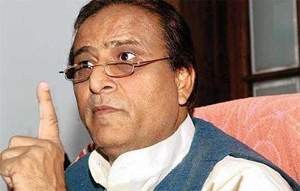 Lucknow, Jan 29: Asking the Muslim community to remain united to prevent Narendra Modi from becoming Prime Minister, Uttar Pradesh Minister Mohd Azam Khan on Tuesday said a big conspiracy was going on to divide Muslims.
Lucknow, Jan 29: Asking the Muslim community to remain united to prevent Narendra Modi from becoming Prime Minister, Uttar Pradesh Minister Mohd Azam Khan on Tuesday said a big conspiracy was going on to divide Muslims.
"There is a big conspiracy going on to divide Muslims... If you are divided, Narndra Modi will form the next government (at the Centre). We all have to remain united," Khan said while addressing a conference of madarsa managers and principals here.
He alleged that whenever SP formed government in the state, some "strong forces" hatched conspiracy to create disturbance with an aim to defame Samajwadi Party.
Attacking the media, Khan alleged that it always wants to keep the wounds of Muzaffarnagar riot fresh without allowing them to heal.
Calling Modi a "murderer", he said such a person could never become Prime Minister.
Citing Rajinder Sachar Committee recommendations, Khan said it had advocated reservation for Muslims stating that they need it more than Dalits.
"The Centre should bring a Bill in this regard (Muslim reservation) and intentions of everyone will be cleared...We will see who protests against it. There is still time left and Congress should bring the Bill," he said.
On the SP government's attempt to withdraw terror cases against some Muslims, he said, "We wanted to withdraw cases against innocent Muslims lodged in jails...But media made such an atmosphere that government had to backtrack."






Comments
Add new comment